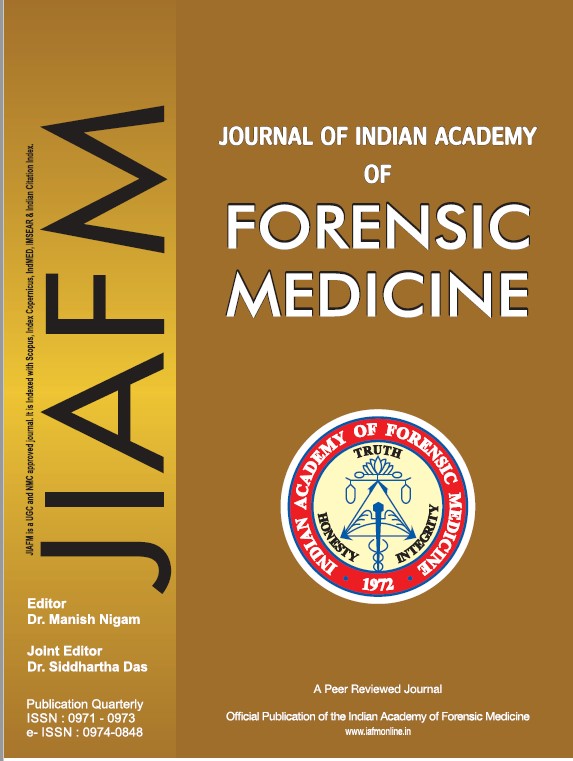Ethical and Legal Issues of Presumed Consent
DOI:
https://doi.org/10.48165/Keywords:
Organ donors, Presumed Consent, Ethical/Legal issuesAbstract
In India shortage of organ donors is a major health problem with ethical and legal concerns and requires immediate attention. Ever since the first transplants were carried out in the 1950s, there has been an imbalance between the availability of donated organs and the number of recipients. The objective of this article is to address various ethical and legal aspects of presumed consent. Presumed consent takes the onus away from the individual to register in order to become organ donor. Instead the individual must sign a register during his life if he is unwilling to donate. The argument which strongly favours this policy is thousands of healthy organs are destroyed every hour due to burial and cremation whereas innumerable people are dying because of want of these organs. The other side of this argument is organ donation should be the choice of the individual and must not be forced. Before passing legislation on presumed consent ethical and legal issues of presumed consent should be addressed and it is better to implement lesser ethically and legally debatable methods to overcome the backlog of organ donors than to introduce law on presumed consent.
Downloads
References
Kounteya Sinha, Drive to right India’s organ donation record, TNN Nov 27, 2010.
Haddow G. "Because you're worth it?" The taking and selling of transplantable organs. J Med Ethics 2006, 32:324-328.
Price D. From Cosmos and Damian to Van Velzen: the Human Tissue Saga continues. Medical Law Review 2003, 11:1-47 4. Abadie A, Gay S. The impact of presumed consent legislation on
cadaveric organ donation: a cross-country study. Journal of Health Economics 2006, 25:599-620
Barbara K Pierscionek. What is presumed when we presume consent? BMC Medical Ethics 2008, 9:8
http://apnews.myway.com/article/20080814/D92I8TC00.html 7. http://www.uktransplant.org.uk/ukt/statistics/statistics.jsp 8. Singapore Ministry of Health. Human Organ Transplant Act 9. Caplan A.L. Organ transplants: The costs of success. Hastings Centre Report, 1983; 13, 23–32.
Cohen C. The case for presumed consent to transplant human organs after death. Transplantation Proceedings, 1992; 24, 2168– 2172.
Council on Ethical and Judicial Affairs, American Medical Association. Strategies for cadaveric organ procurement: Mandated
choice and presumed consent. Journal of the American Medical Association, 1994 272, 809–812.
Erin C.A., Harris J. Presumed consent or contracting out. Journal of Medical Ethics, 1999; 25, 365-366.
Franz H.G., Drachman J., DeLong W., Beasely C., Gortmaker S.L. Public attitudes toward organ donation: Implications for OPO coordinators. Journal of Transplant Coordination, 1995; 5, 50–54.
Gallup Survey: The American public’s attitudes toward organ donation and transplantation; 1993. http://www.transweb.org/reference/articles/gallup_survey/gallup_ind ex.html.
Kennedy I., Sells R.A., Daar A.S., Guttman R.D., Hoffenberg R., Lock M., Radcliffe-Richards J., Tilney N. The case for ‘presumed consent’ in organ donation. The Lancet, 1998; 351, 1650-1651.
Kluge E.H. Improving organ retrieval rates: Various proposals and their ethical validity. Health Care Analysis, 2000; 8, 279–295. 17. Loewy E.H. Presuming consent, presuming refusal: Organ donation and communal structure. Health Care Analysis, 2000; 8, 297–308. 18. Michael B. Gill Matas A.J., Veith F.J. Presumed consent for organ retrieval. Theoretical Medicine, 1984; 5,155–166.
Moustarah F. Organ procurement: Let’s presume consent. Canadian Medical Association Journal, 1998; 158, 231–234. 20. Sade R.M., Kay N., Pitzer S., Drake P., Baliga P., Haines S. Increasing organ donation: A successful new concept. Transplantation Proceedings, 2000; 74, 1142–1146.
Spital A. Mandated choice: The preferred solution to the organ shortage? Archives of Internal Medicine, 1992; 152, 2421–2424


